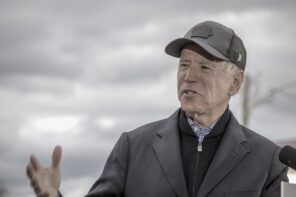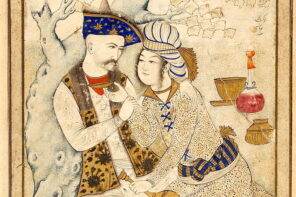This is the way the Muslim calendar works: because it’s lunar, it slips back about 11 days each Gregorian year. Lunar months are 29 or 30 days (years are 354 or 355 days). So every 33-odd Gregorian years, the Muslim calendar makes a full pilgrimage through the seasons. When I was growing up, Ramadan, the most sacred month of the Muslim year, was in the winter.
Muslims abstain from food, drink, and sex during daylight hours. Ramadan in the New England winter is a bit like cheating: Fasting for incredibly short days is nice and easy. (The cold weather also means there’s less to look at, if you follow my meaning.) This year, Ramadan comes in August. A lot of my fellow New York Muslims dreaded the approach of Ramadan in the summer, to say nothing of this year’s unbearable humidity. But I was worried about Ramadan for months now, and for another reason.
When the first sliver of a crescent moon is sighted, it marks the beginning of a new month (or a new year). Some Muslims have adopted calculation in advance, choosing to figure out the months well in advance. Makes it easier to plan. Others, myself included, like to wait up all night to hear word. If anyone across the Americas has in fact spotted that first crescent, then we enter Ramadan. The last day of Ramadan ends with the next crescent moon, marking Eid ul-Fitr—one of the two biggest holidays of the Muslim year. (The other commemorates Abraham’s near-sacrifice of his son, which coincides with the Hajj pilgrimage to Mecca.)
Traditionally, Muslims wake up early on Eid, dress in their finest, and make a trip out to the mosque for a special holiday prayer and sermon. Then, there is usually some kind of brunch, and people spend the rest of the day visiting friends and family, and eating as often as they can. (It is, after all, marking the end of a month of fasting.) This year, Eid ul-Fitr may be on September 9th, 10th, or 11th.
Strangers in Our Own Lands
It was worrying enough to think about how some people might misinterpret such a convergence, and that was before the rise in Islamophobic rhetoric. Every other day, I’m greeted with someone arguing that Muslims are all evil, that we shouldn’t have any more mosques in America, that we are a dastardly fifth column. The assumption here is always that Muslims are foreigners and intruders, that we are strangers in our own lands, unwelcome in our own homes.
Let me tell you why this collective guilt so frustrates. I’ve spent most of the last twelve years in Manhattan. That includes September 11th, 2001. I was a senior in college, walking to class on an unbelievably clear day, when the towers were struck and then fell, and we saw clouds of debris fill the sky. The World Trade Center was there and then it wasn’t.
As president of New York University’s Islamic Center, I saw some of the hurt firsthand, I felt some of the anguish, I received some of the hate and I knew, immediately, how far across the world the effects of that vile attack would reach. I remember police sirens screaming, panicked rumors, overwhelmed faces, taxicabs turned into ambulances, the sinking feeling of powerlessness. Over and over, I heard “this is like a movie”—because we couldn’t imagine this was happening, that thousands had just perished in the Towers we’d seen every day from campus, filling the sky to the south.
I remembered bumping into tourists, every few days, who’d ask: “which way’s north?” Or south, or east, or west. I’d smile, and turn south, and point out the World Trade Center. I’d tell them: Just keep an eye on that, and you’ll always know where to go. But there was just smoke, and it stole more and more of the sky, overcoming that beautiful September morning with a sick smell.
If Eid ul-Fitr falls on the anniversary of that day, it will be an especially difficult task for a Muslim in New York. Many of our congregations were hurt that day, either personally or through the loss of loved ones. Many good friends of mine rushed to ground zero to give aid and spent hours, even days, doing what they could for the victims and for the brave first responders who were badly wounded. Some of those going to give help got hurt themselves. Others have relatives now working on the site, rebuilding the World Trade Center.
How does an imam approach this? How do I, as an American and a Muslim, deal with what people claiming my religion did to us—New Yorkers, Americans, human beings? How do I explain that I was scared because my city was attacked, but I was also scared because people might blame me? I tried to rush down to help, but by the time I got further downtown there was too much smoke to go any further. People rushing in the opposite direction, coming from out of the smoke, screamed—maybe at me—where are you going?
At a loss for what to do, I thought I should go to the Muslim prayer room on campus, where students, anxious and afraid, might gather for help. The subways were closed, and cell phone service had gone out. I had no other idea how to find my friends, no idea where else to go. At the very least, I thought I had a responsibility to the Muslim students on campus. (Then again, I really had no idea what to do. I just thought I had to do something, anything, to help.) Walking into our prayer space, which was located inside a Catholic church, I saw a friend of mine, an observant Jewish student, by himself. Turns out he had wanted to help, too.
“What are you doing here?” I asked. (He was, of course, not exactly who I expected to see.) He said, “I figured that some Muslims might feel uncomfortable walking home”—people had already begun to blame any number of extremist Muslim groups, and of course the subways had been shut down—“and that, if I walked home with them, maybe people would think twice before trying anything.” (He wore a yarmulke).
Responding Together
If I give a sermon for Eid ul-Fitr, I’ll tell that story. For the younger congregants to whom that day might be distant memory, it’s important they hear how, even on that terrible day, mere minutes after the Towers were struck, New Yorkers stepped up. We did so without regard to race and religion. We did what we had to do, for each other, and in the days and weeks to follow, I remember dozens of people saying: “I didn’t think we had it in us.” Most people think New Yorkers don’t care about each other. I know, from experience, that this is very, very far from the truth.
I hope my message reaches the hundreds of millions of Americans who weren’t in New York that day, but who were hurt, and angry, and still feel the wounds of that day, as I do. I pray they see that we were all attacked that day. And we responded together, we banded together, we did what we had to do for each other, for complete strangers—those first responders, some of them Muslim, some Christian, some Jewish, and all of them heroes—didn’t ask who they were saving. They did the right thing, something I am still in awe of, and they gave their lives for their commitment to this city, to their duty, to their fellow men and women.
And I would quote a verse in the Qur’an, which tells us that whoever saves a life, it’s like he’s saved all of humanity.




